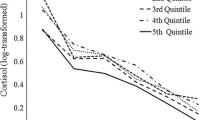Abstract
This study examined the relations betweensociotropy, autonomy, and stress severity ratings forhypothetical life events that were objectivelycategorized as interpersonal or achievement-related infocus. The hypothesis that sociotropy and autonomyserve as vulnerability factors to dysphoria in thepresence of life stress that matches the theme of thevulnerability was also examined in 6-week and 12-week follow-up evaluations. Results provided onlypartial support for the predicted relations amongsociotropy, autonomy, and perceived stress severityratings of interpersonal and achievement-related events. Longitudinal results failed to support thehypothesis that sociotropy and autonomy serve asvulnerability factors for matching interpersonal andachievement-related stress. It was concluded thatobjectively categorizing life events as interpersonal orachievement-related is problematic given that themeaning of life events can vary across individuals, andthat these meanings are likely to vary partly as a function of sociotropy and autonomy.
Similar content being viewed by others
REFERENCES
Beck, A. T. (1983). Cognitive therapy of depression: New perspectives. In P. J. Clayton & J. E. Barrett (Eds.), Treatment of depression: Old controversies and new approaches(pp. 265–290). New York: Rave n Press.
Beck, A. T., Rush, A. J., Shaw, B. F., & Emery, G. (1979). CoGnitive therapy of depression.New York: Guilford Press.
Blatt, S. J. (1974). Level of object representation in anaclitic and introjective depression. Psychoanalytic Study of the Child, 29,107–157.
Blatt, S. J., D'Afflitti, J. P., & Quinlan, D. M. (1976). Experience s of depression in normal young adults. Journal of Abnormal Psychology, 85,383–389.
Buss, A. H. (1980). Self-consciousness and social anxiety.San Francisco: Freeman.
Cohen, J., & Cohen, P. (1983). Applied multiple regression/correlation analysis for the behavioral sciences(2nd ed.). Hillsdale, NJ: Erlbaum.
Coyne, J. C., & Whiffen, V. E. (1995). Issues in personality as diathesis for depression: The case of sociotropy-dependency and autonomy-self-criticism. Psychological Bulletin, 118,358–378.
Dohrenwend, B. S., & Dohrenwend, B. P. (1978). Some issues in research on stressful life events. The Journal of Nervous and Mental Disease, 166,7–15.
Hammen, C., Ellicott, A., & Gitlin, M. (1989). Vulnerability to specific life events and prediction of course of disorder in unipolar depressed patients. Canadian Journal of Behavioral Science, 21,377–388.
Hammen, C., Ellicott, A., Gitlin, M., & Jamison, K. R. (1989). Sociotropy/autonomy and vulnerability to specific life events in patients with unipolar depression and bipolar depression. Journal of Abnormal Psychology, 98,154–160.
Hammen, C., Marks, T., Mayol, A., & deMayo, R. (1485). Depressive self-schemas, life stress, and vulnerability to depression. Journal of Abnormal Psychology, 94,308–319.
Harris, R. N., & Snyder, C. R. (1986). The role of uncertain self-esteem in self-handicapping. Journal of Personality and Social Psychology, 49,273–280.
Lakey, B., & Ross, L. T. (1994). Dependency and self-criticism as moderators of interpersonal and achievement stress: The role of initial dysphoria. Cognitive Therapy and Research, 18,581–599.
Mongrain, M., & Zuroff, D. C. (1989). Cognitive vulnerability to depressed affect in dependent and self-critical college women. Journal of Personality Disorders, 3,240–251.
Robins, C. J., Hayes, A. M., Block, P., Kramer, R. J., & Villena, M. (1995). Interpersonal and achievement concerns and the depressive vulnerability and symptom specificity hypotheses: A prospective study. Cognitive Therapy and Research, 19,1–20.
Robins, C. J., Ladd, J. S., Welkowitz, J., Blaney, P. H., Diaz, R., & Kutcher, G. (1994). The Personal Style Inventor y: Preliminary validation studies of sociotropy and autonomy. Journal of Psychopathology and Behavioral Assessment, 16,277–300.
Rude, S. S., & Burnham, B. L. (1993). Do interpersonal and achievement vulnerabilities interact with congruent events to predict depression? Comparison of DEQ, SAS, DAS, and combined scales. Cognitive Therapy and Research, 17,531–548.
Sarason, I. G., Johnson, J. H., & Siegel, J. M. (1978). Assessing the impact of life changes: Development of the Life Experiences Survey. Journal of Consulting and Clinical Psychology, 46,932–946.
Snyder, C. R., & Harris, R. N. (1987). The role of similarity/difference information in excuse-making. In C. R. Snyder & C. E. Ford (Eds.), Coping with negative life events: Clinical and social psychological Perspectives(pp. 347–369). New York: Plenum Press.
Swindle, R. W., Jr., Heller, K., & Lakey, B. (1988). A conceptual reorientation to the study of personality and stressful life events. In L. H. Cohen (Ed.), Life events and psychological functioning: Theoretical and methodological issues(pp. 237–268). Beverly Hills, CA: Sage.
Rights and permissions
About this article
Cite this article
Kwon, P., Whisman, M.A. Sociotropy and Autonomy as Vulnerabilities to Specific Life Events: Issues in Life Event Categorization. Cognitive Therapy and Research 22, 353–362 (1998). https://doi.org/10.1023/A:1018757128916
Issue Date:
DOI: https://doi.org/10.1023/A:1018757128916



